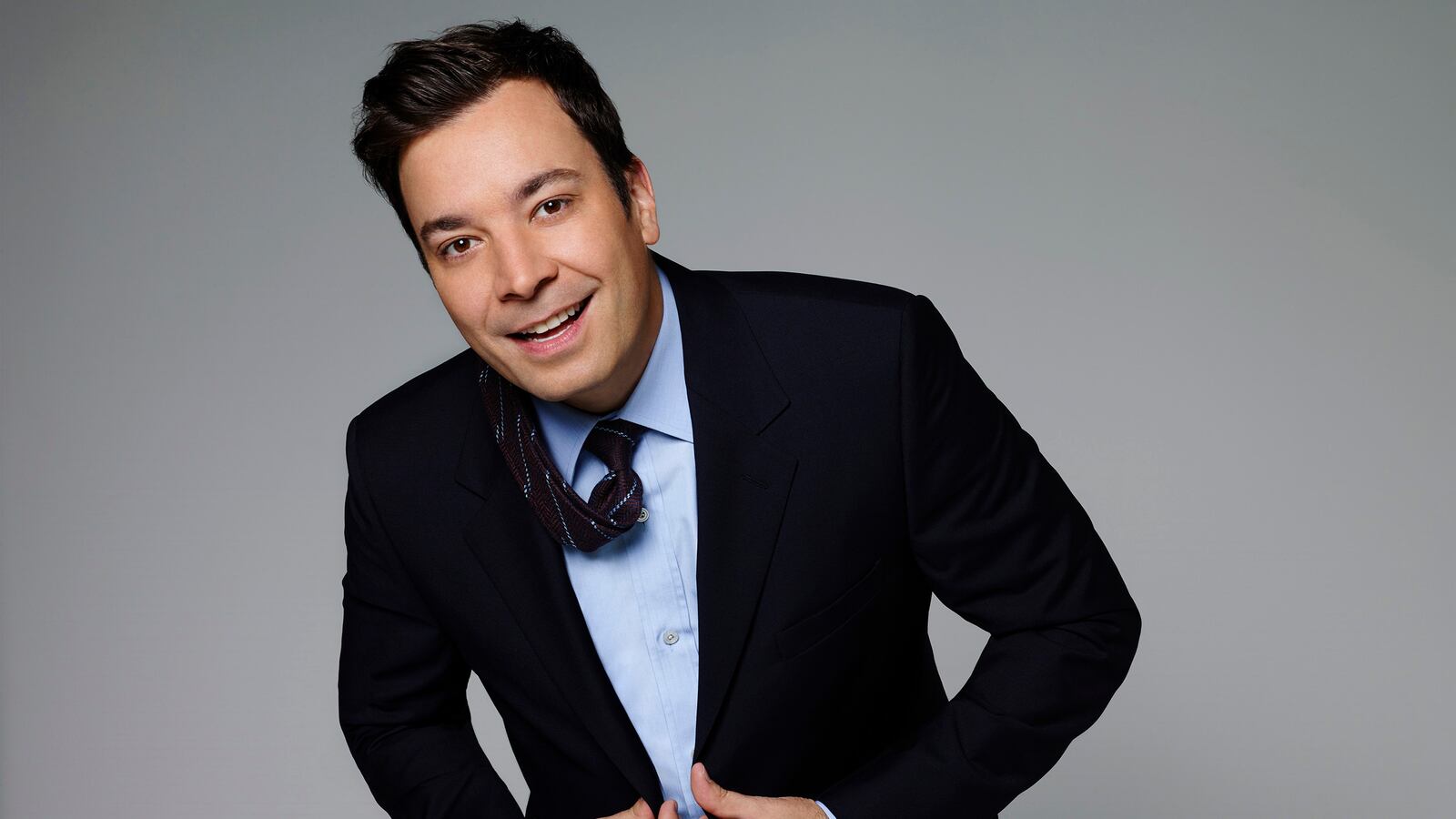Johnny Carson once compared the delivery of his nightly monologue to the plight of a man threatening suicide from a skyscraper window ledge “while down on the ground, the crowd is yelling ‘Jump! Jump!’”

Jack Paar lamented one night long ago that after years of struggle in show business, he’d ended up as “a night-light to the bathroom” for millions of viewers.
And Jay Leno, who just noisily concluded his 22-year gig as host of The Tonight Show, told Ellen DeGeneres that the bad part of the job was “you have to go home and write jokes every single night,” which he won’t have to do any more.
For much of the six-decade history of The Tonight Show, the host’s opening monologue has been an icon within an icon, an institution within an institution. The Tonight Show, despite a few temporary name changes over the years and a succession of emcees, remains one of the great mainstays, and conspicuous money-makers, of American television. And when Jimmy Fallon ascends to the lauded position of host tonight on NBC, his opening monologue will be one large gauge by which the sleepy-time audience judges him.
Not only because it brings in millions in profits (during Carson’s heyday, Tonight was said to be responsible for 30 percent of the network’s total revenue), The Tonight Show is one of the few surviving pillars on which the wobbly network’s fate and fortunes rest.
“The Tonight Show stands at the center of the comedy universe,” says Rick Ludwin, for 30 years the executive in charge of late-night programming at NBC (and now a network consultant). “It’s obviously one of the crown jewels that Comcast paid all that money for,” when the avaricious cable giant bought NBC-Universal in 2011, Ludwin says. Comcast, acquisitive octopus that it is, has a new, $45 billion bid for Time Warner Cable currently on the table.
As much of the ostensibly civilized world knows, the charmingly ingenuous Fallon is the sixth performer to be named host of NBC’s definitively venerable show, and within the semi-cloistered world of commercial broadcasting, his rise to the top has the impact and even spiritual aura of a papal succession. Insiders and outliers and nearly everyone else is abuzz: Can Fallon handle the job? Is he the right man at the right time? Will he uphold the honorable tradition of the nightly monologue as one of America’s most-quoted political, social and cultural barometers?
Fallon, who spent six hilarious years as a cast member of Saturday Night Live, once confessed that writing jokes about newsmakers for the topical “Weekend Update” segment with co-anchor Tina Fey sometimes marked the first time he’d heard of them. Some viewers may get their news from watching “Update” (or other topical TV shows); Fallon got some of his news from writing it. But he’s become considerably hipper in the intervening years, during which he delivered a sharp and smart nightly monologue as host of Late Night, the show that follows Tonight.
Late Night, once hosted by the great David Letterman—still the smartest and quickest-witted of all late-night hosts—will be hosted by another former “Update” anchor, Seth Meyers, as of Feb. 24.
Whether or not Fallon’s credentials as a topical satirist are dauntingly auspicious, there’s a lot more to the job of Tonight show host than that, and Fallon comes anything but under-equipped. In fact he is probably the most versatile performer ever to helm the show.
Anyone who saw Fallon do the warm-up for Saturday Night Live, entertaining and energizing the studio audience with his singing, dancing, impressions, guitar-playing, jokes—just about everything but mending china—or who saw the now-legendary audition tape with which Fallon impressed SNL creator-producer Lorne Michaels, is likely to regard Fallon’s abilities with near-awe.
So he can do sketches, he can interview celebrities (he’s made progress at curbing his sometimes excessive enthusiasm for fellow performers), he can ad-lib snappy banter with his sidekick-announcer (Steve Higgins) or the show’s brilliantly eclectic house band (The Roots, the only late-night band with a tuba)—but can he pass the ultimate if elementary test for hosting a late-night talk show: can he be ingratiating simply by being himself, and can he be simply himself while hosting a late-night network talk show?
Based on his Late Night track record, the answer would seem to be a ridiculously obvious yes. Although sometimes alarmingly hyper, Fallon has accomplished the neat trick of keeping his inner boyishness alive. He’s too skilled and assured in the spotlight to be considered an innocent, but, like Carson, he seems not to have lost touch with the star-struck kid from a middle-class American home who watched and listened and absorbed a zillion images while growing up.
On more than one level, the Tonight show would seem to be in very good, very safe hands. Fallon could conceivably have a shorter shakedown period than either Leno (whose first months were disastrous) or Carson (who lacked authority in his earliest years as host). In addition, the Tonight show now comes under the vastly expanding aegis of Lorne Michaels, the creator and longtime executive producer of “SNL.” Michaels’ late-night domain now includes all three cornerstone shows—Tonight, Late Night and SNL, the highest-rated and most profitable of the group.
But what about the negatives? Fallon and Michaels are returning The Tonight Show to New York, even to the same studio, 6-B in 30 Rock, where Paar once presided over it, in spite of the fact that the show’s move from New York to Los Angeles in 1972 (two years before Fallon’s birth) was prompted by the supposed scarcity of suitable available guests in the Big Apple. Apparently this celebrity shortage is over and there are now enough guests to be divided among Tonight, Late Show with David Letterman on CBS and NBC’s Late Night, also emanating from 30 Rock.
Even if there are enough celebrity guests, however, there’s some question whether there’ll be a sufficient tourist supply to provide studio audiences for all three shows five nights a week. Perhaps hotels will offer package deals through which visitors can visit all the talk-shows on three successive nights. Maybe even—a bidding war for audience members? It’s not impossible. Absurd, but not impossible, like so much that’s going on in the world.
“They’re all making money,” Ludwin says of the late-night network shows, and he sees no reason why that won’t continue. But how can they all make money when there are more and more programming sources competing for dollars even as the great Audience Pie is divided into smaller and smaller slices? One answer is that the networks have been working fastidiously to trim the production costs of the shows. Both Leno and Letterman took large pay cuts within the past few years, and Ludwin says simple economies like cutting back on limousines and fancy catered dinners at the office have helped keep the late-night shows prosperous.
And Advertising Age pointed out recently that for the Fallon Tonight show to succeed, it doesn’t have to deliver audiences nearly as large as those who watched in Carson’s day or even during the Leno era. The playing field and the late-night economy have changed.
Items that might seem drains on the budget may in fact be boons. The musical acts that arrive with grim regularity at the ends of the talk shows and whack out a number or two are not costing the producers of those shows a fortune in fees. Anything but. For years—decades, Ludwin says—the musical acts have been more than paying their own way. Their appearances are engineered and underwritten by record labels and public relations firms. Exposure on late-night TV can mean a dandy boost in sales for the dozens of groups that pour into the system every year, so they’re thrilled to be there.
Late-night television is written about more than prime-time television is, and the reasons seem fairly obvious. Unlike much of prime-time, which is filmed weeks or months in advance, the late-night talk shows remain responsive to the events of the day; they traffic in the zeitgeist, and these days the zeitgeist can change radically in a few months. It’s been said the definition of a “generation” is now three years. The national mania for newness can be best reflected in programming that is produced daily and has no more claim on longevity or permanence than microwave oatmeal. It’s one long mad dash, and late-night TV is in the thick of it.
Some people have picked on Fallon because he is young (not quite 40) and can seem naïve. But these are exploitable qualities, not liabilities. He does have problems to work on, including a tendency to let giant personalities commandeer his show. He should have stood up to Bill Cosby, for instance, the night Cosby decided to position himself on Fallon’s shiny wood floor and tastelessly chose to insult the Roots band as “pitiful.”
Fallon let as frivolous a lightweight as the increasingly androgynous Bruce Jenner intimidate him into defensiveness (over Jenner jokes that Fallon had been telling) and perhaps defers too readily to frequent guest Justin Timberlake, although the pair do “click” and have been responsible for some of the show’s liveliest segments.
Then there was the one-wonderful-night when Fallon had Howie Mandel in the guest chair, Mandel having been deposited there by NBC to plug the network’s grating prime-time amateur hour, America’s Got Talent. Mandel is one of the celebrity “judges” on the show. As one of his first questions, Fallon asked Mandel in all earnestness if Mandel had any talent. Good question, Jimmy!
Mandel looked flustered; he obviously considers himself a talented comic. What Fallon meant was whether Mandel had any of the talents celebrated on the show—singing, dancing, balancing dogs on one’s nose, whatever. But the little blooper that resulted made Fallon seem more ingratiating than ever. In fact, some of us would like to think that Fallon meant it as a sly dig and knew exactly what he was asking. And that little boy is growing up.
Go get ‘em, Jimmy. The world after 11:35 p.m. is yours.





